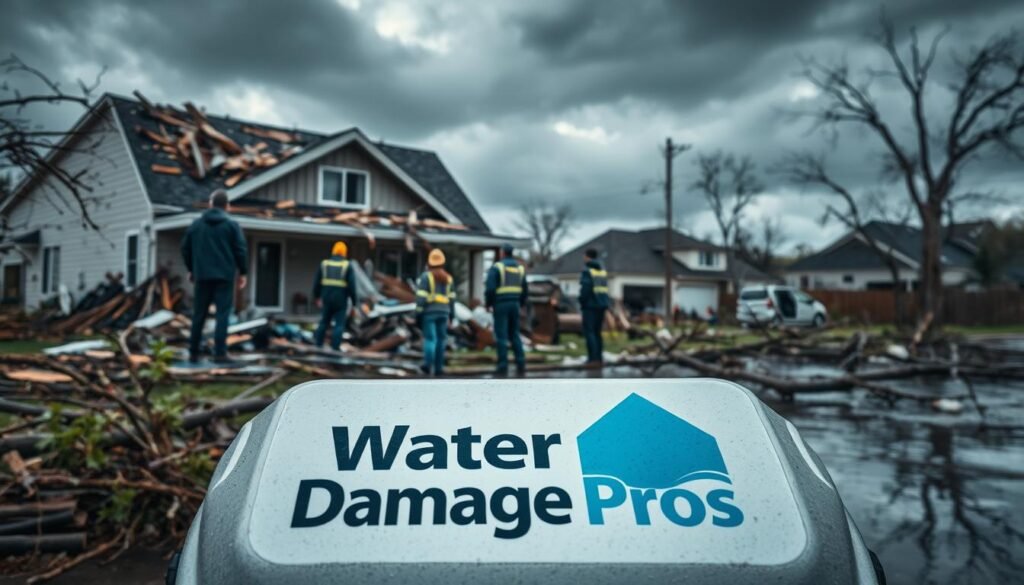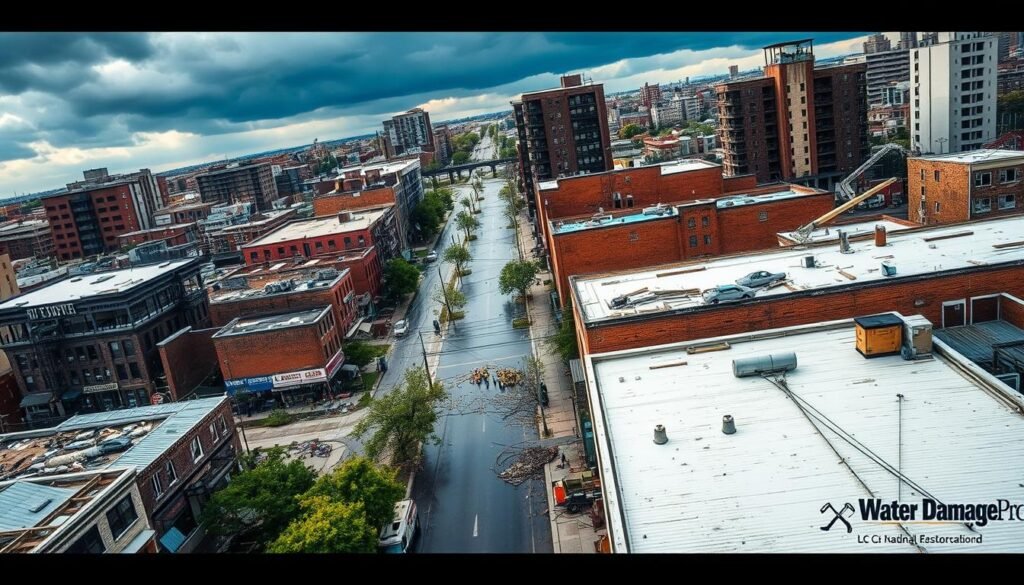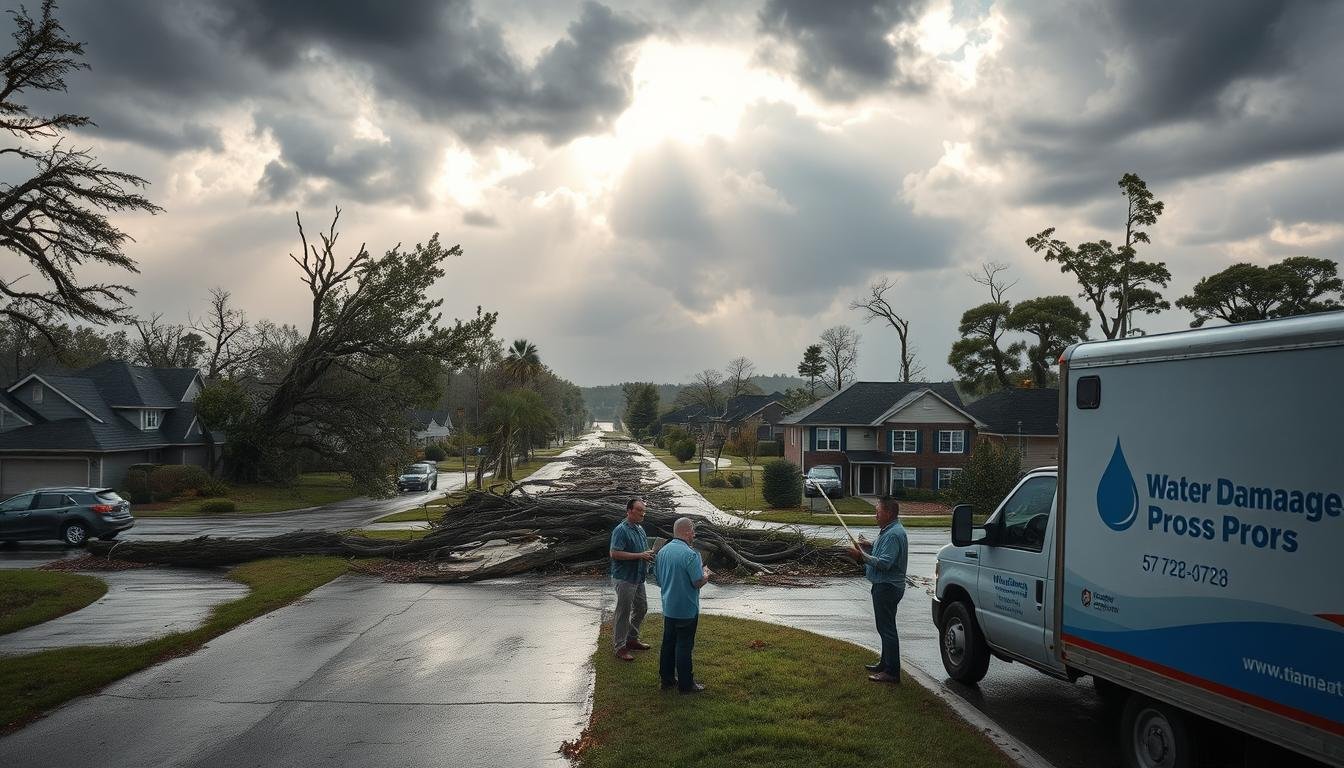In 2017, over 4.6 million people applied for FEMA help in Texas, Puerto Rico, and Florida because of hurricanes. This shows how important storm-specific damage assessments are. They are not just forms; they are a lifeline for communities hit by disasters.
These assessments are key for protecting and planning to recover from property damage. They happen quickly after a disaster is declared. Local, state, and federal teams do these checks. They decide if you can get FEMA’s Individual Assistance Program and help from Community Development Block Grants.
Water Damage Pros – San Bernardino says accurate assessments are crucial. They help plan for aid and restoration. A detailed check after a storm can mean getting the help you need or facing recovery alone. Estimating property damage is a big part of these checks.
Key Takeaways
- Over 4.6 million FEMA assistance applications were filed in 2017 due to hurricanes
- Storm-specific damage assessments determine eligibility for crucial assistance programs
- Accurate assessments are vital for proper aid and recovery planning
- Natural disaster evaluations involve local, state, and federal entities
- Timely post-storm inspections can significantly impact recovery outcomes
Understanding Storm-Specific Damage Assessments
Storm-specific damage assessments are key to figuring out property damage after natural disasters. They help homeowners and insurance companies see how much damage there is. This way, they can plan for repairs.
What Are Storm-Specific Damage Assessments?
These assessments check property damage from different storms. They look at Wind Damage, Flood Risk, and how solid the structure is. Experts use special tools and methods to find both obvious and hidden damage.

Importance of Quick Response After a Storm
It’s crucial to act quickly after a storm. Fast assessments can prevent more damage and start fixing things right away. FEMA says to do Preliminary Damage Assessments (PDAs) within 30 days to see if federal help is needed.
Overview of Assessment Techniques
Experts use visual checks, drones, and infrared to assess damage. These methods help with detailed Wind Damage Analysis and Flood Risk Assessment. They also check if buildings are safe after storms.
| Assessment Type | Tools Used | Benefits |
|---|---|---|
| Wind Damage Analysis | Drones, Visual Inspection | Identifies roof and exterior damage |
| Flood Risk Assessment | Moisture Meters, Infrared Cameras | Detects hidden water damage |
| Structural Integrity Examination | Ultrasonic Equipment, Laser Scanners | Evaluates building stability |
By using these methods, experts can give accurate damage reports. This helps make sure repairs are done right and saves money for homeowners.
The Process of Conducting an Assessment
Catastrophe Response Planning and Emergency Preparedness Strategies are key in storm damage assessments. The process includes a detailed inspection, the use of advanced tools, and the expertise of professionals.
Initial Inspection Procedures
The assessment starts with contacting property owners and setting up site visits. Trained teams then inspect the area, noting visible and hidden damage. This step is crucial for a solid restoration plan.

Tools and Technologies Used
Modern damage assessments use the latest technology:
- Drones for aerial surveys
- 360° cameras for detailed documentation
- Infrared moisture mapping to find hidden water damage
These tools help in quick and accurate assessments. They are essential for effective Emergency Preparedness Strategies.
How Water Damage Pros Handles Assessments
Water Damage Pros takes a detailed approach:
- Securing facilities to prevent more damage
- Creating effective restoration plans
- Talking directly with clients about data and recovery options
Their expert teams use advanced technologies for thorough assessments. This gives clients peace of mind during tough times.
| Assessment Step | Tools Used | Benefits |
|---|---|---|
| Initial Inspection | Visual inspection, cameras | Quick damage overview |
| Detailed Survey | Drones, 360° cameras | Comprehensive documentation |
| Hidden Damage Detection | Infrared moisture mapping | Identifies unseen issues |
Key Benefits of Storm-Specific Damage Assessments
Storm-specific damage assessments are key to protecting your property and finances. They give valuable insights that help a lot in recovering after a storm.
Minimizing Financial Loss
Property Damage Estimation is a big part of these assessments. Spotting problems early can stop them from getting worse and save money. For example, finding hidden roof damage from hail early can stop water leaks.
Ensuring Proper Restoration Plans
Good assessments mean better repair plans. A Structural Integrity Examination finds weak spots from storms. This helps make a detailed fix plan, fixing all problems and stopping new ones.
Peace of Mind for Homeowners
Damage assessments clear up what happened and what needs fixing. Knowing this lets you make smart choices about repairs, insurance, and moving temporarily.
| Assessment Type | Benefits |
|---|---|
| Property Damage Estimation | Early problem detection, Cost reduction, Accurate insurance claims |
| Structural Integrity Examination | Comprehensive repair plans, Future damage prevention, Safety assurance |
Experts use advanced tech like UAS-based multispectral imagery to find hidden damage. This ensures a complete check of your property.
Frequently Asked Questions About Storm Damage Assessments
After a storm, it’s important for homeowners to check their property for damage. Here are some common questions about storm damage assessments and natural disaster evaluations.
Hidden storm damage can be hard to find. Experts use special tools like infrared moisture mapping to find hidden problems. Look for signs like water stains, musty smells, or slight changes in your home’s structure.
If you’re not sure, it’s best to call in the experts for a detailed post-storm inspection.
When should I schedule an assessment?
Book a storm damage assessment as soon as you can after a storm. Quick action helps prevent more damage and speeds up recovery. Many companies offer 24/7 services for natural disaster evaluation, so you can get help when you need it.
What should I do if I suspect damage after a storm?
If you think your home was damaged, stay safe first. Avoid dangers like downed power lines or unstable structures. Take photos of any damage you see, but don’t remove anything before the inspection.
Contact a professional service for a thorough post-storm inspection. They can help you understand the damage and guide you through insurance claims if needed.


